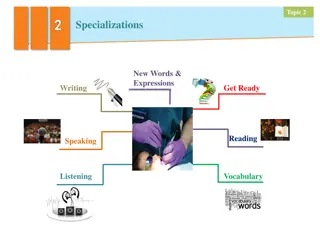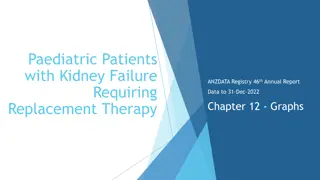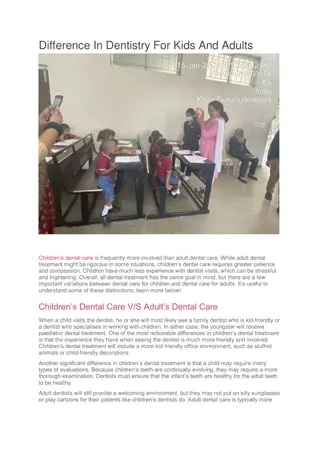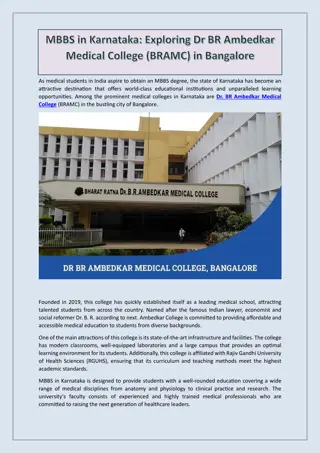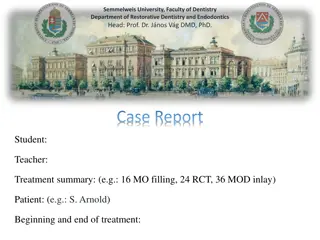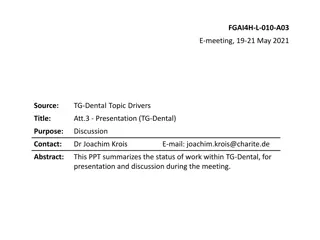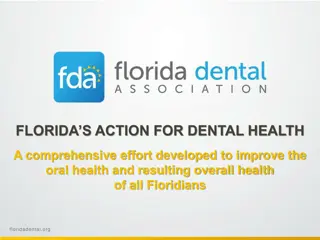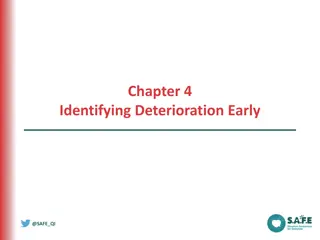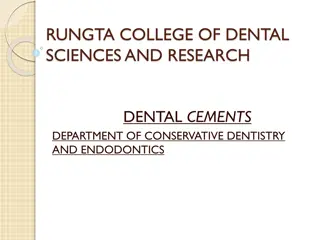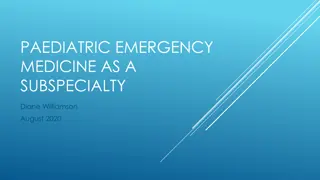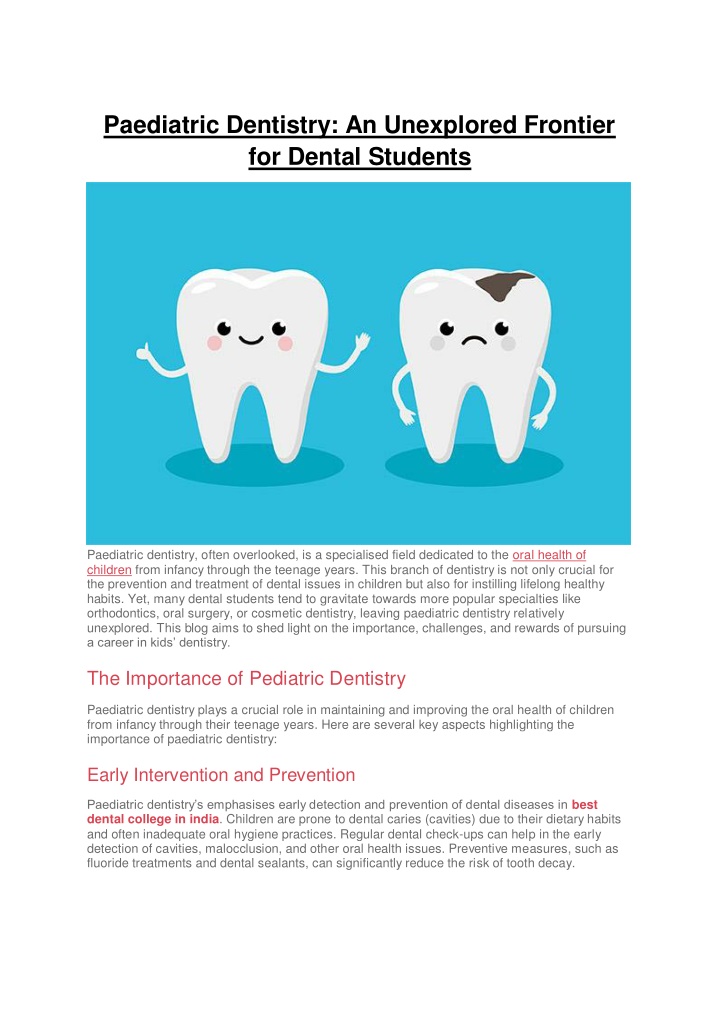
Paediatric Dentistry | dental colleges in karnataka RRDCH
Paediatric dentistry, often overlooked, is a specialised field dedicated to the oral health of children from infancy through the teenage years.
Uploaded on | 1 Views
Download Presentation

Please find below an Image/Link to download the presentation.
The content on the website is provided AS IS for your information and personal use only. It may not be sold, licensed, or shared on other websites without obtaining consent from the author. If you encounter any issues during the download, it is possible that the publisher has removed the file from their server.
You are allowed to download the files provided on this website for personal or commercial use, subject to the condition that they are used lawfully. All files are the property of their respective owners.
The content on the website is provided AS IS for your information and personal use only. It may not be sold, licensed, or shared on other websites without obtaining consent from the author.
E N D
Presentation Transcript
Paediatric Dentistry: An Unexplored Frontier for Dental Students Paediatric dentistry, often overlooked, is a specialised field dedicated to the oral health of children from infancy through the teenage years. This branch of dentistry is not only crucial for the prevention and treatment of dental issues in children but also for instilling lifelong healthy habits. Yet, many dental students tend to gravitate towards more popular specialties like orthodontics, oral surgery, or cosmetic dentistry, leaving paediatric dentistry relatively unexplored. This blog aims to shed light on the importance, challenges, and rewards of pursuing a career in kids dentistry. The Importance of Pediatric Dentistry Paediatric dentistry plays a crucial role in maintaining and improving the oral health of children from infancy through their teenage years. Here are several key aspects highlighting the importance of paediatric dentistry: Early Intervention and Prevention Paediatric dentistry s emphasises early detection and prevention of dental diseases inbest dental college in india. Children are prone to dental caries (cavities) due to their dietary habits and often inadequate oral hygiene practices. Regular dental check-ups can help in the early detection of cavities, malocclusion, and other oral health issues. Preventive measures, such as fluoride treatments and dental sealants, can significantly reduce the risk of tooth decay.
Behavioural Management One of the unique aspects of paediatric dentistry is behavioural management. Dentists working with children need to be adept at handling the anxieties and fears of their young patients. This requires a combination of patience, empathy, and effective communication skills. Techniques such as Tell-Show-Do, positive reinforcement, and the use of sedation when necessary are part of the paediatric dentist s toolkit. Comprehensive Care Paediatric dentists are trained to provide comprehensive oral care that goes beyond just treating cavities. They assess and manage the overall growth and development of a child s oral structures. This includes monitoring the development of the jaw and teeth, managing oral habits like thumb sucking and pacifier use, and providing guidance on nutrition and oral hygiene. Special Needs Dentistry Children with special needs require tailored dental care, which paediatric dentists are specifically trained to provide. These children may have physical, developmental, or cognitive impairments that necessitate a different approach to dental care. Paediatric dentists play a crucial role in ensuring that these children receive the appropriate care in a compassionate and understanding environment. Challenges in Pediatric Dentistry Understanding these challenges is crucial for dental students and practitioners to provide effective and compassionate care to young patients. Here are some of the key challenges faced in paediatric dentistry: Communication Barriers Communicating with children can be challenging, especially with very young or non-verbal patients. Paediatric dentists must be skilled in interpreting non-verbal cues and working closely with parents to understand the child s needs and concerns. Behavioural Issues Managing the behaviour of young patients is perhaps the most significant challenge in paediatric dentistry. Children may be uncooperative, fearful, or anxious about dental visits. Paediatric dentists must employ various behaviour management techniques to help children feel comfortable and secure. Complex Cases Treating children with extensive dental issues or those with special health care needs can be complex. Paediatric dentists must often collaborate with other healthcare professionals to provide comprehensive care. They need to be well-versed in paediatric medicine and developmental psychology to address the unique needs of their patients. Parental Involvement Engaging and educating parents is a crucial part of paediatric dentistry. Dentists must ensure that parents understand the importance of oral hygiene, healthy dietary practices, and regular
dental check-ups. This requires effective communication skills and the ability to build trust and rapport with families. Rewards of a Career in Pediatric Dentistry For those passionate about working with children and making a significant impact on their health and well-being, this specialty provides unique opportunities such as: Making a Difference Paediatric dentists have the opportunity to make a significant impact on their patients lives. By instilling good oral hygiene habits and addressing dental issues early, they contribute to the overall health and well-being of children. The positive influence of a paediatric dentist can last a lifetime. Professional Satisfaction Working with children and seeing their progress can be incredibly rewarding. Helping a child overcome dental fears, relieving pain, and witnessing their smile transformation provides a sense of professional fulfilment that is unique to paediatric dentistry. Diverse Work Environment Paediatric dentistry offers a dynamic and varied work environment. When you enter the field there won t be a single day without challenges presenting opportunities to learn and grow.
Paediatric dentists work in a variety of settings, including private practices, hospitals, and academic institutions, providing a range of career opportunities. Long-term Relationships Paediatric dentists often build long-term relationships with their patients and their families. These relationships are built on trust and continuity of care, which can be deeply rewarding both personally and professionally. Educational Pathway and Training Pursuing a career in paediatric dentistry requires a combination of extensive education, specialised training, and a commitment to continuous learning. An overview of which is traced below for your reference: Specialised Training: To become a paediatric dentist, one must first complete a dental degree (DDS or DMD) followed by a specialised residency program in paediatric dentistry. These programs typically last 2-3 years and provide in-depth training in child psychology, growth and development, paediatric sedation, and the management of dental trauma. Certification: After completing the residency program, dentists can become board- certified by the American Board of Pediatric Dentistry (ABPD) or equivalent bodies in other countries. This certification process involves a comprehensive examination that tests the dentist s knowledge and skills in paediatric dentistry. Continuing Education: Paediatric dentistry is a continually evolving field, and staying current with the latest research and techniques is essential. Paediatric dentists must commit to lifelong learning through continuing education courses, attending conferences, and participating in professional organisations. The Future of Pediatric Dentistry Paediatric dentistry is evolving rapidly, shaped by technological advancements, shifting healthcare paradigms, and an increasing emphasis on preventive care. Let s take a look at what the future holds for paediatric dentistry. Technological Advancements Advances in technology are transforming paediatric dentistry. Innovations such as digital radiography, laser dentistry, and teledentistry are improving diagnostic accuracy and patient care. Paediatric dentists must stay abreast of these developments to provide the best possible care to their patients. Emphasis on Preventive Care The focus on preventive care is growing in paediatric dentistry. There is an increasing emphasis on educating parents and children about the importance of oral hygiene, healthy eating habits, and regular dental check-ups. Preventive care can significantly reduce the incidence of dental diseases and improve overall health outcomes. Interdisciplinary Collaboration The future of paediatric dentistry lies in interdisciplinary collaboration. Paediatric dentists will increasingly work with other healthcare professionals, including paediatricians, nutritionists, and
speech therapists, to provide comprehensive care as this collaboration can allow you a better approach to tap every aspect of a child s health. Research and Development Research in paediatric dentistry is expanding our understanding of oral health in children. Studies on topics such as the impact of early childhood caries, the effectiveness of different preventive measures, and the genetic factors influencing dental health are paving the way for new treatment protocols and preventive strategies. The End Thought Paediatric dentistry is a vital and rewarding field that offers unique challenges and opportunities for dental students. We at RRDCH believe that despite being relatively unexplored, the field of paediatric dentistry holds immense potential for those who are passionate about working with children and making a lasting impact on their health and well-being. By choosing a career in paediatric dentistry, dental students can contribute to a brighter future for countless children, fostering healthy smiles that last a lifetime. Embracing this specialty requires dedication, patience, and a genuine love for working with young patients, but the rewards both professional and personal are immeasurable.





